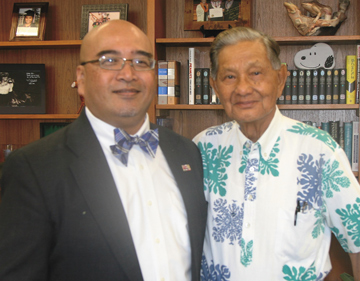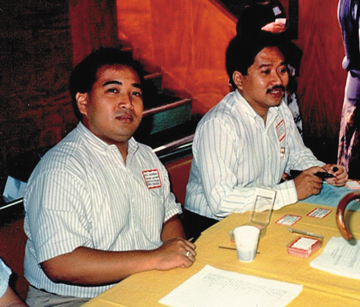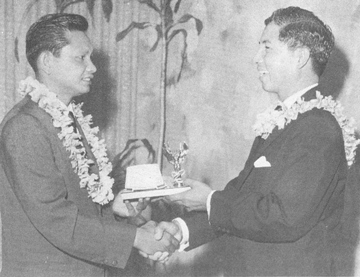
Jacob “Jake” Magarro Manegdeg
Sparrow and quintessential Filipino community leader.
Gilbert S.C. Keith-Agaran | Photos courtesy Gil Keith-Agaran
History, they say, is written by the winners.
Often that means a narrative dominated by the prominent men and women of a particular time or place. Think Jack Burns. Dan Inouye. Patsy Mink.
It is more challenging to also recognize people who helped the big names accomplish what history remembers.
At the December 2006 conference on O‘ahu that closed the yearlong Filipino Centennial commemoration, two local attorneys—Alfredo Evangelista and I participated in a Maui panel on the Sakadas. They titled their part, “Oral History, Myths and Legends in the Sakada Narrative.” As the abstract for their talk described, “The Filipino farm laborers imported to Hawai‘i in the 20th century were relatively uneducated and did not document their plantation experiences. Except for limited participation Filipino-American leaders in oral history projects and relatively recent scholarship, much of the journey to Hawai‘i and the plantation experience have been described by third parties through the prism of myth and legends about the role of Labor in the development of modern Hawai‘i and the rise of the Democratic Party. What has been disclosed to spouses, children, grandchildren and other relatives reveals some general acceptance of an accepted story, collective myth or group history. The myth and legends that have been passed onto the children, grandchildren and relatives of the Sakadas from Maui raise issues about community memory, group values and collective lessons.”
I do not discount the pivotal role of returning Nisei veterans in shifting Hawai‘i from an expected Republican stronghold (Democratic Alaska and Republican Hawai‘i joined the union together in part to maintain the balance of power between the two major political parties). But when the ILWU is included as a critical player, Filipinos remain on the outskirts—while the influx of Ilocano plantation workers added to the union rolls, most of the leaders came from earlier arrivals to the sugar and pineapple fields.
Legendary Democratic Party organizer Bob Oshiro described the battalions of campaign volunteers, largely in the background, as “sparrows.” In some traditions, sparrows symbolize love, loyalty and hope. Some now would focus on sparrows as destructive and invasive—colonists, I suppose.
But the sparrow term is still worn proudly by many pioneers of the fondly remembered 1954 Democratic Party revolution.
One of those veteran quiet and effective sparrows recently passed.

Photo: Alfredo Evangelista
Jacob “Jake” Magarro Manegdeg, 94, was born on June 7, 1929 and peacefully passed away on January 8, 2024.
Jake was the quintessential Filipino community leader.
He arrived in Hawai‘i as a one-year-old from Bangui, Ilocos Norte and spent the remaining ninety-some years of his life in the islands. Jake grew up in Wailuku, Maui before staying on O‘ahu after completing school. He became a card-carrying Democratic Party member in 1962. Over the decades, he became known for his many hours as a Democratic Party grassroots organizer, precinct and county committee officer and as a key supporter for many successful elected officials.
He would make a living as an insurance agent and real estate broker.
But he made his mark in the larger Filipino community.

Photo courtesy Gilbert Keith-Agaran
Jake recalled he was first drawn to community service when then-Consul General Juan Dionisio recruited his help with the Miss Hawai‘i Filipina pageant. He recalled in a 2017 interview, “I was single then, what can I say?”
Over the years, Jake would head many a Filipino scholarship pageant. From the Filipino beauty circuit, Jake broadened his involvement to local activism. During his initial term as United Filipino Council of Hawai‘i President, Jake worked to have the organization endorse candidates for the first time in the 1976 Elections. He remained involved in the conventions of the O‘ahu Filipino Community Council.
Jake did take on the limelight beyond the Filipino community when Governor George Ariyoshi tapped him to fill then State House seat vacated by Donna Mercado Kim (Moanalua – Salt Lake – Āliamanu). Donna and another young legislator, Arnold Morgado, opted for the City Council when several members were recalled by the voters. Ariyoshi appointed at the same time a young electrical engineer named David Ige to the Morgado House vacancy. One of his official acts was to participate in a Sakada tree planting ceremony on Jan. 9, 1986.
Jake had previously worked at the legislature for Barney Menor and Kenneth Lee.

Image courtesy Filipino Chamber of Commerce of Hawai‘i
Jake was among the O‘ahu leaders who fought to establish and fund the Filipino Community Center in Waipahu, where his long relationships with community and political leaders pushed the project forward.
Even in retirement, Jake remained an advocate under the umbrella of the Filipino American Citizens League—submitting testimony at the Legislature on Filipino-American veterans’ issues, employment discrimination reform, underrepresentation of Filipinos in education and addressing the growth of youth gangs in local communities.
He was named Filipino Chamber of Commerce “Man of the Year” in 1963, and then received a Filipino Community Center “Bayanihan Award” in 2017. Jake also served as Vice-Chair of the Filipino Centennial Commission. He twice served as President of the United Filipino Council of Hawai‘i.
Jake is one of many behind-the-scenes people who should be remembered as much as the more well-known and prominent Ben Cayetanos, Benjamin Menors, Cecelia Suyat Marshalls, Simeon Acobas, Emme Tomingbang Burns, Bruno Mars, and Nestor Garcias. Our history is filled by flocks of these sparrows who also deserve recognition.
 Gilbert S.C. Keith-Agaran practices law in Wailuku. He served in the Ben Cayetano administration (1995–2002), the first Alan Arakawa administration (2003–2005), the State House of Representatives (2009–2013), and the State Senate (2013–2023).
Gilbert S.C. Keith-Agaran practices law in Wailuku. He served in the Ben Cayetano administration (1995–2002), the first Alan Arakawa administration (2003–2005), the State House of Representatives (2009–2013), and the State Senate (2013–2023).
